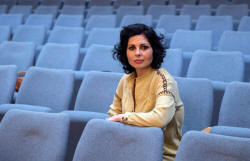|
"In Between", which has an Arab director and a Jewish
producer, won best film at the Haifa International Film Festival
in October and accolades in Toronto and San Sebastian with its
portrayal of three very different women who share an apartment
in Israel's most liberal city.
Layla is a lawyer and liberal Muslim who parties every night;
Salma, from a traditional Christian family, is gay and works as
a DJ and bartender; and Nour is a devout Muslim computer student
whose Muslim fiancé rapes her.
"The women have chosen to seek a modern life by abandoning the
customs and traditions of their home villages but at the same
time, as ethnic Palestinians in Tel Aviv, they encounter
discrimination," director Maysaloun Hamoud told Reuters.
"They just can't win."
The film addresses issues that some of Israel's Arabs - who make
up about 20 percent of the country's 8.5 million people - prefer
not to see on screen.
The conservative leadership of Umm al-Fahm, a large Arab Israeli
town which features in the film, has called for the movie to be
boycotted.
"We support art that has a purpose and art that criticizes the
negative aspects of our society, but we oppose a movie that
distorts the image of Umm al-Fahm," Abed Al-Monem Fuad, a
spokesman for the municipality, said.
Sana Jammelieh, who plays Salma, said it was time for Israel's
Arab community to address the movie's subject matter.
"No one wants to talk about homosexuality, or a woman who feels
free enough to party all night and drink alcohol, but they
should be discussed so that (Arab society) can catch up with the
modern world," she said.
Mouna Hawa, who plays Layla, expected the criticism but said it
did not worry her: "It took courage to make this film but I feel
convinced that it reflects many real lives in our society."
(Editing by Ori Lewis and Robin Pomeroy)
[© 2017 Thomson Reuters. All rights
reserved.] Copyright 2017 Reuters. All rights reserved. This material may not be published,
broadcast, rewritten or redistributed.
 |
|




